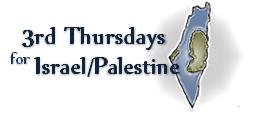3rd Thursday Action Alert: Call for a ceasefire; end the Gaza blockade and provide safe spaces for Gazan non-combatants; release and do not harm hostages; oppose further militarization
The devastating loss of life in Israel and the occupied Palestinian territories since October 7 has overshadowed what had already been one of the deadliest years for both peoples in recent memory. While efforts must be intensified to halt the bloodshed, appeal to all parties to respect international humanitarian law and firmly promote long-term diplomatic efforts, the humanitarian crisis in Gaza must be addressed immediately.
Israel has imposed a 16-year blockade of Gaza, which it has tightened since the start of the war. US officials should call upon Israel to:
- allow for humanitarian aid to be brought in,
- allow Gazans to access safe spaces such as UN schools, hospitals, etc., and
- respect those safe spaces. Israel’s indiscriminate and violent response that has already claimed hundreds of civilian lives, primarily in Gaza, must end.
As Israel has now given 1.1 million Palestinians in Gaza 24 hours to “move south” from Gaza City, and given that Gaza is sealed with no space for Gazans to move to, the US and United Nations must ensure the protection of Palestinians in Gaza.
We also unequivocally deplore Hamas’ vicious attack and call for the immediate release of all hostages in captivity.
Already US churches have spoken several times and this week appealed to Congress to:
- Publicly call for ceasefire, de-escalation and restraint by all parties;
- Call on all parties to abide by the laws of war, including the Geneva conventions, customary international law and international human rights law; and
- Prioritize steps to secure immediate release of hostages and international protection for civilians.
Further offensive military assistance to Israel cannot “remedy” its immediate intelligence failure and the United States should not provide such aid. All in the international community must redouble their diplomatic efforts to halt the current crisis and prevent a downward spiral toward an even wider regional war.

